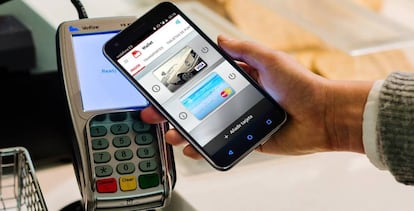Are smartphones the new wallet? The apps that are replacing credit cards, tickets and driver’s licenses
A growing number of people are using their cellphone to make purchases, present health documents and carry transportation passes

What if instead of carrying cards in your wallet, you used your smartphone to pay for meals, use public transportation and earn loyalty points at your favorite store? It’s an option that has become a very real possibility thanks to the growing number of phone apps. But there are still some stumbling blocks to address: not all smartphones are compatible with these apps and depending on a cellphone’s battery life, it may not be the best option.
Credit cards
The number of people who are using their smartphones as a mobile wallet is rising sharply. According to the database company Statista, the use of apps such as Apply Pay and Google Pay in North America is expected to double between 2020 and 2025, and Asia’s market is expected to become even bigger. The use of mobile wallets soared during the coronavirus pandemic, as people avoided cash payments due to concerns over transmission, and travel restrictions made it difficult to access ATMs.
A smartphone needs to be NFC-enabled in order to act as a digital wallet (NFC stands for near-field communication, and it allows mobile devices to share data with other equally equipped devices.) Several apps, such as Google Pay, Apple Pay and Samsung Pay, are compatible with a wide range of banks. To make a payment, you just place the back of your cellphone on top of the payment terminal and authorize the transaction. If your phone is not compatible with these apps, or if you have privacy concerns, you may also be able to use your bank’s app to make a payment. Some businesses also accept payment via platforms such as Venmo or Cashapp, meaning you do not need an NFC-enabled cellphone.
To protect yourself from cybercrime, digital security company ESET recommends that you select biometric methods for unlocking and locking your phone, and enable notifications every time a transaction or payment is made. “This way, if there’s suspicious activity, you will get a notification almost at once,” says the company, which adds that some apps also allow extra security steps, such as two-factor authentication.
To prevent these apps from gathering more information than needed, users are advised to check the permits they require.
Driver’s license
Some countries allow you to carry your driver’s license on your phone. In the United States, over 20 states have either considered, tested or have already released digital versions of driver’s licenses, with other states indicating they might be joining them soon, according to The Washington Post. Drivers, however, are still advised to carry their car’s physical documents, in case something happens to their phone or they cross into a state that does not recognize the digital license.
These systems may vary, but the first steps are usually similar, i.e. download the relevant app and scan your license, then verify your identity with a photograph. The states that offer mobile drivers’ licenses – also known as mDLs – maintain that digital IDs are helpful, but are not a replacement for physical documents.
Health cards and vaccination certificates
The US health system offers SMART Health Cards, which are “paper or digital versions of your clinical information, such as vaccination history or test results.” They are presented as QR codes that, once scanned, bring up the holder’s medical information. This card can also include information about a person’s Covid-19 vaccination status.
Concert and train tickets
Apps such as Passwallet, for Android users, and Apple Wallet, for iPhone users, allow you to store and organize a large number of documents, including credit cards, concert tickets, train passes, and even hotel keys. Some BMW owners, for example, are able to open and start their cars with Apple Wallet.
These apps work in a very simple way. There are lots of different ways to add a card to the digital wallet. In most cases, you will receive a notification via email or SMS. You will then need to click on the link or the file and open it up in the app. With Passwallet, you can add a card just by scanning its barcode or QR code, while Apple Wallet allows users to manually upload a card’s details.
Loyalty cards
When it comes to organizing loyalty cards, one of the most popular apps is Stocard. Users can add cards from multiple shops, supermarkets, gas stations, clothing stores and more. To add a card, you just need to scan it or manually introduce the details. Then, to collect loyalty points, you simply show the barcode on your cellphone. Users can also access special coupons and offers that are only available on the app.
Are there any documents you can’t carry on your phone?
It’s still too soon to completely do away with wallets. Many countries have not reached this level of digitalization, while others do not allow important documents, such as IDs, to be uploaded to an app. This is expected to change sooner rather than later. But whether people decide to forgo their wallets will still largely depend on the infrastructure available to them.
Tu suscripción se está usando en otro dispositivo
¿Quieres añadir otro usuario a tu suscripción?
Si continúas leyendo en este dispositivo, no se podrá leer en el otro.
FlechaTu suscripción se está usando en otro dispositivo y solo puedes acceder a EL PAÍS desde un dispositivo a la vez.
Si quieres compartir tu cuenta, cambia tu suscripción a la modalidad Premium, así podrás añadir otro usuario. Cada uno accederá con su propia cuenta de email, lo que os permitirá personalizar vuestra experiencia en EL PAÍS.
¿Tienes una suscripción de empresa? Accede aquí para contratar más cuentas.
En el caso de no saber quién está usando tu cuenta, te recomendamos cambiar tu contraseña aquí.
Si decides continuar compartiendo tu cuenta, este mensaje se mostrará en tu dispositivo y en el de la otra persona que está usando tu cuenta de forma indefinida, afectando a tu experiencia de lectura. Puedes consultar aquí los términos y condiciones de la suscripción digital.









































